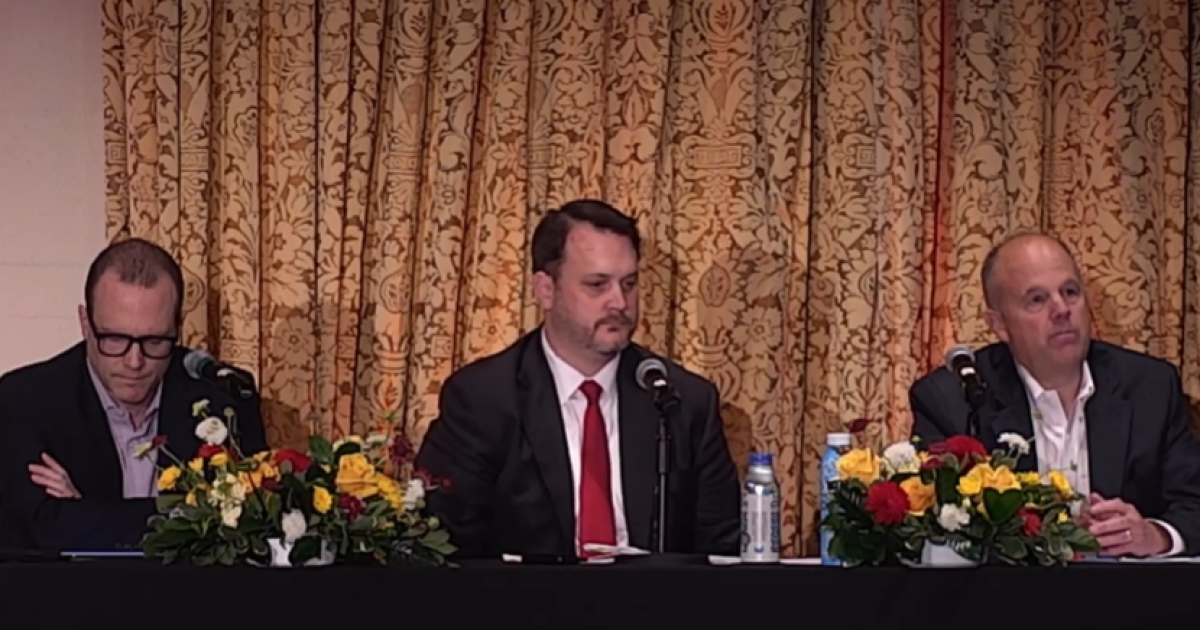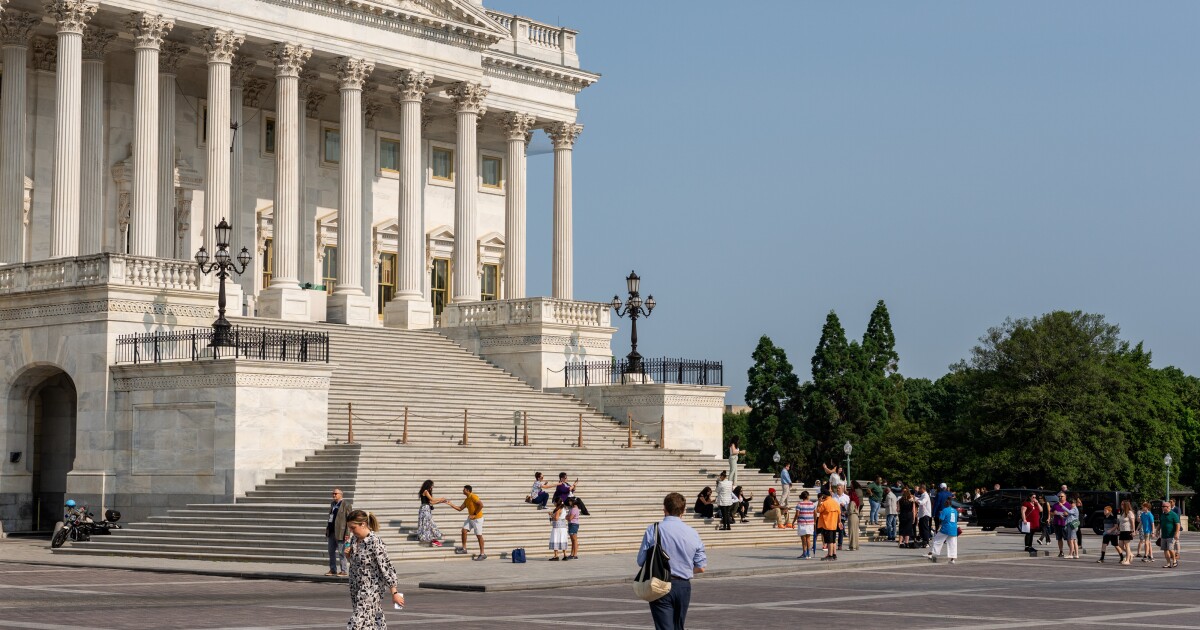President Donald Trump and his economic team are increasingly focusing on the revenues his tariffs would generate as he seeks to get tax cuts through Congress, pointing to an ominous path ahead for countries trying to avoid a trade war.
Trump needs as much revenue as he can get as Republicans in Congress are working to iron out a plan to extend the 2017 tax cuts that are due to expire later this year, along with additional cuts, at an overall cost of $4.5 trillion over the next 10 years.
The White House has touted using tariffs for everything from reducing trade imbalances to increasing leverage over countries to hammer out deals. Economists question Trump’s logic, warning that tariffs will lead to slower growth and thus declining government revenues while also prompting retaliation from other nations.
But comments by Trump and his top economic advisors on Thursday showcased their growing emphasis on using tariffs as an income generator for the government.
In a social media post, Trump pointed to “lots of money coming in from tariffs” as a way to help balance the federal budget, which is projected to have a roughly $2 trillion deficit this fiscal year. That followed the president’s declaration Wednesday evening that the government would be taking in “tremendous tariff money.”
Another part of the revenue answer, according to the Trump administration, is spending cuts being identified by Elon Musk and his Department of Government Efficiency, which so far claims to have found some $55 billion in savings, although questions have been raised about that total.
Increasingly, though, the White House is talking up the lengthening list of tariffs that Trump has rolled out or threatened.
Speaking to reporters on Thursday, Kevin Hassett, head of Trump’s National Economic Council, said a 10% levy on imports from China introduced earlier this month would generate “between $500 billion and a trillion dollars over 10 years.”
Separately, Commerce Secretary Howard Lutnick told Fox Business that an order by Trump to impose “reciprocal” tariffs aimed at other economies’ tax and regulatory barriers alone could “earn us $700 billion a year.” Trump’s trade czar added those funds would help eliminate the budget deficit and cause interest rates to “come smashing down” with the result being that “the whole economy explodes higher.”
Tariff throwback
The U.S. depended on tariffs as the major source of government revenues through the 19th century, which Trump has pointed to as inspiration for his belief in the revenue-generating powers of import duties.
But the federal government was much smaller then and everything changed with the introduction of an income tax in 1913. Since the Second World War, tariffs have never generated much more than 2% of total federal revenue, according to a Congressional Research Service report published in January.
The U.S. imported $3.3 trillion in goods last year, according to official data, and are currently subject to an applied average of around 3%. In order to raise the $700 billion Lutnick projected, new tariffs would have to rise significantly.
If maximizing revenues was the goal, a U.S. tariff rate approaching 50% would be optimal and result in $780 billion in revenues, economists at the Peterson Institute for International Economics calculated last year. But that figure would go down over time as trade patterns shifted and the economy slowed, wrote economists Kim Clausing and Maurice Obstfeld.
Pursuing that as policy in the longer term “would actually lose revenue because of the contractionary consequences of such high tariffs,” the economists said.
Since the 1930s, U.S. trade policy has mostly focused on lowering tariffs in order to convince other countries to do the same, while opening up new markets for U.S. goods.
Trump and his supporters argue that hasn’t worked and point to China’s rise as the world’s manufacturing superpower as evidence.
“It’s a huge departure” from decades of U.S. trade policy and one that could lead to higher prices and slower growth, said Mary Lovely, another economist at the Peterson Institute.
It could also backfire politically, she said. President William McKinley ultimately changed his mind on tariffs after what amounted to a working-class revolt against higher prices. That episode set the stage for the shift to income taxes.
Trump and his aides are pitching the tariffs as a tax paid by other countries. But studies show they are typically paid by U.S. importers with the cost often passed on to consumers.
In the wake of the 2024 election in which inflation was a big driver of Trump’s victory, “those reasons to not like a tariff still exist very much,” Lovely said.
Fiscal priority
Republicans in Congress are receptive to the idea of higher tariff revenues in the short term, even if there are questions about how they can factor them into their accounting under the rules they have to abide by to expedite passage of a tax bill.
“When you care about the fiscal health of the nation as a whole, you have to look at the possible influx of future revenues that could come from the president’s trade proposals,” Representative Jason Smith, chairman of the influential Ways and Means Committee told Bloomberg Television in February.
That domestic priority is likely to compete with any plans Trump may have to also use tariffs as a tool for economic diplomacy.
Focusing on revenues could also create an entirely new dynamic for U.S. trade officials used to zeroing in on lowering trade barriers rather than generating income, said Daniel Mullaney, a former top U.S. trade negotiator now at the Atlantic Council think-tank. Though that is how many developing countries like India have historically approached negotiations, he said.
“That’s the new part,” Mullaney said. “Now we are considering the tariffs and lowering tariffs as revenue foregone and raising tariffs as revenue coming in.”
If raising revenues is Trump’s real tariff priority, it would make it very hard for the European Union and U.S. to avoid an escalating trade war in the months to come, said Ignacio Garcia Bercero, a former EU trade negotiator, now at think-tank Bruegel.
“That’s not good from the European perspective,” he said. “It’s clear that all of this suggests that there is not really much that you can actually negotiate.”


 Personal Finance1 week ago
Personal Finance1 week ago
 Economics1 week ago
Economics1 week ago
 Economics6 days ago
Economics6 days ago
 Economics1 week ago
Economics1 week ago
 Economics6 days ago
Economics6 days ago
 Economics6 days ago
Economics6 days ago
 Economics4 days ago
Economics4 days ago
 Finance6 days ago
Finance6 days ago












